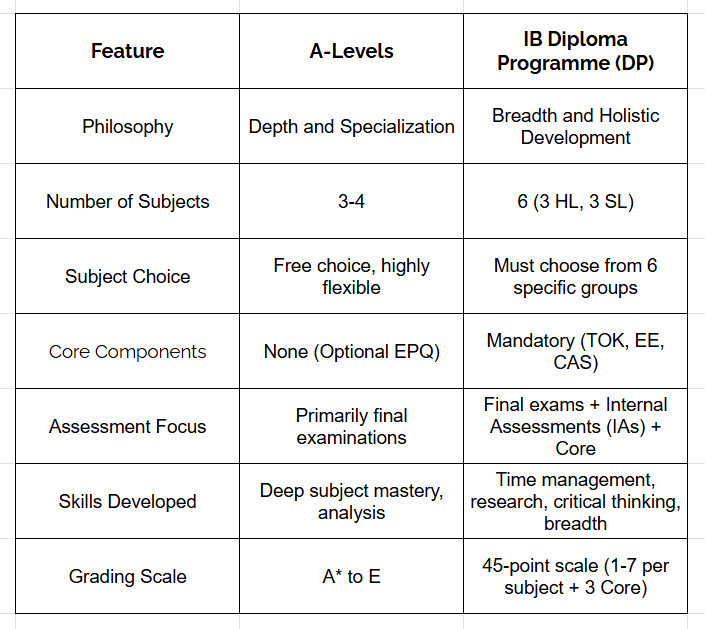IB DP vs. A-Levels: The Definitive Dubai Comparison (2025/2026)
1. Introduction: The Critical Choice for Sixth Form
Choosing between the International Baccalaureate Diploma Programme (IB DP) and the British A-Levels is arguably the most significant academic decision a student will make in Dubai. Both are rigorous, globally recognized qualifications that open doors to the world’s leading universities. However, they differ significantly in philosophy, structure, and the demands they place on students.
The choice between A-Levels and the IB DP depends primarily on the student’s learning style and university aspirations. A-Levels offer depth and specialization, allowing students to focus on 3-4 subjects they excel at.

The IB DP offers breadth and holistic development, requiring students to study 6 subjects alongside the Core components (TOK, EE, CAS). Neither is inherently “better,” but one will be a better fit for the individual student.
This guide provides a comprehensive comparison of the IB DP and A-Levels within the Dubai context, examining the structure, assessment style, workload, and university recognition to help you make an informed decision for the 2025/2026 academic year.
Table of Contents
2. The Core Philosophies: Depth vs. Breadth
The fundamental difference between the two systems lies in their educational philosophy.
A-Levels: The Gold Standard of Specialization
The British A-Level system is designed for early specialization. It allows students to focus intensely on the subjects they are passionate about and intend to pursue at university.
The Philosophy: To achieve mastery and deep understanding within a narrow field of study.
The Outcome: Students develop sophisticated knowledge in their chosen areas. If a student knows they want to be an engineer, they can focus solely on Mathematics, Further Mathematics, and Physics.
IB DP: The Holistic Approach to Critical Thinking
The IB philosophy is centered on the Learner Profile, aiming to develop well-rounded, internationally-minded individuals.
The Philosophy: To encourage critical thinking, interdisciplinary connections, and breadth of knowledge. Students must continue studying languages, sciences, mathematics, and humanities throughout the two years.
The Outcome: Students develop strong critical thinking, research, and time-management skills. They are often better prepared for the diverse demands of university study and the global workplace.
3. Curriculum Structure: Specialization vs. Holism
The structural differences directly impact the student’s workload and focus.
A-Levels Structure
Subjects: Students typically take 3 subjects, though highly motivated students may take 4. There are no restrictions on subject combinations.
Core Components: None (though some schools offer the Extended Project Qualification (EPQ), which is similar to the IB Extended Essay, but usually optional).
Flexibility: High. Students can drop subjects they dislike or find irrelevant to their future goals. For a deeper look, you can review the structure of the British Curriculum and Key Stages.
IB DP Structure
Subjects: Students must take 6 subjects, chosen from specific groups (Language A, Language B, Sciences, Mathematics, Individuals and Societies, Arts/Elective).
Levels: 3 subjects must be taken at Higher Level (HL) and 3 at Standard Level (SL).
The Core (Mandatory):
Theory of Knowledge (TOK): An interdisciplinary course on critical thinking.
Extended Essay (EE): A 4,000-word independent research paper.
Creativity, Activity, Service (CAS): Non-academic requirements for holistic development.
Flexibility: Low. The structure is rigid, requiring students to continue subjects they may find challenging. You can find more detail on mastering the components of the IB Curriculum.
IB DP vs. A-Levels Comparison Table

4. Assessment Style: How You Are Graded
The way students are assessed is a key differentiator and can significantly influence performance.
A-Levels Assessment
A-Levels are primarily assessed through high-stakes examinations at the end of the two-year program (linear assessment).
Focus: Exam technique, deep recall, and application of knowledge under timed conditions.
The Risk: Performance heavily depends on the final exams. A student having a bad day during the exam period can significantly impact their final grades.
Grading: Graded on a scale from A* (highest) to E.
IB DP Assessment
The IB uses a more diversified approach to assessment.
Internal Assessments (IAs): Coursework, investigations, and projects completed during the two years and assessed internally (moderated externally). IAs typically account for 20-30% of the final grade in each subject.
The Core: TOK and the EE are assessed and contribute up to 3 bonus points.
Final Examinations: Externally assessed exams at the end of the program.
The Advantage: The diversified assessment reduces the pressure on the final exams. Strong performance in IAs can provide a buffer.
Grading: Graded out of 45 points. A minimum of 24 points is required to pass (subject to conditions).
5. The Learning Experience: Workload and Skills
The day-to-day experience of studying these two curricula is vastly different.
The A-Level Experience
Workload: Intense within the chosen subjects. However, students often have more free periods (study periods) during the school day as they are only managing 3-4 subjects.
Skills Developed: Deep analytical skills, subject mastery, and independent study habits focused on specific areas.
The Challenge: The jump in difficulty from IGCSE to A-Level is significant. Students must be highly motivated in their chosen subjects. The lack of mandatory research components (like the EE) means students may need to proactively develop these skills for university.
The IB DP Experience
Workload: High volume and relentless. Students must juggle 6 subjects, multiple Internal Assessments with conflicting deadlines, the Extended Essay, TOK assignments, and CAS commitments.
Skills Developed: Exceptional time management, organization, resilience, research skills, and the ability to synthesize information across disciplines.
The Challenge: The risk of burnout is high if the workload is not managed effectively. Students must consistently perform across all areas; they cannot afford to neglect any subject. The demands of the IB often necessitate specialized support to manage the workload and components.
Which is Harder?
This is the most common question, and the answer is nuanced:
A-Levels are harder in terms of depth. The complexity of the material covered in A-Level subjects is often comparable to, or sometimes exceeds, that of IB HL subjects.
The IB DP is harder in terms of workload and breadth. The organizational challenge and the sheer volume of work across diverse areas make the overall program extremely demanding.
6. University Recognition: UK, US, and Global Perspectives
Both the IB DP and A-Levels are highly respected globally. However, their reception can vary slightly depending on the region.
UK Universities (UCAS)
A-Levels: The traditional pathway. UK universities understand the A-Level structure intimately and make offers based on three grades (e.g., A*AA).
IB DP: Highly regarded. UK universities appreciate the rigor and the skills developed (especially the EE). Offers are made based on the total IB score (e.g., 38 points) and often include specific requirements for HL subjects.
The Nuance: For highly specialized courses (like Engineering or Medicine), the depth provided by A-Levels can sometimes be advantageous. However, the IB is equally accepted.
US Universities
IB DP: Exceptionally well-regarded. The breadth of the IB aligns well with the US liberal arts philosophy. The research skills developed through the EE and IAs are highly valued. Strong IB scores can often lead to course credit (advanced standing).
A-Levels: Recognized, but sometimes less understood than the IB. US universities may require a combination of A-Levels and standardized tests (though many are now test-optional).
The Nuance: The IB DP is often seen as providing a slight edge in US admissions due to its holistic nature and emphasis on research.
Global Recognition (Europe, Canada, Australia)
Both curricula are widely accepted. European universities often appreciate the breadth of the IB, while Commonwealth countries are very familiar with the A-Level structure.
7. The Dubai Context: School Availability and KHDA
In Dubai, the choice may also be influenced by practical considerations.
Availability: The British Curriculum (A-Levels) is the most widely offered system in Dubai. However, the number of high-quality IB World Schools is growing rapidly.
Dual Offerings: Many top-tier schools in Dubai now offer both the IB DP and A-Levels (and sometimes BTECs) in Sixth Form, allowing students to choose the pathway that suits them best within the same institution.
KHDA Standards: The KHDA rigorously inspects both British and IB schools, ensuring high standards of education regardless of the curriculum chosen.
8. Making the Decision: Who Thrives Where?
The “best” curriculum is the one that aligns with the student’s strengths, interests, and learning style.
A-Levels are the Best Fit for "Specialists"
A student is likely to thrive in the A-Level system if they:
Have a clear idea of what they want to study at university.
Have strong passions and demonstrated aptitude in 3-4 specific subjects.
Strongly dislike certain subjects (e.g., a brilliant scientist who struggles with languages).
Prefer assessments based primarily on final examinations.
Are looking for in-depth A-Level mentorship in their chosen fields.
The IB DP is the Best Fit for "All-Rounders"
A student is likely to thrive in the IB DP if they:
Are a strong all-rounder with aptitude across multiple disciplines.
Are unsure of their future career path and want to keep their options open.
Enjoy research, critical thinking, and interdisciplinary learning.
Possess (or are willing to develop) strong time-management and organizational skills.
Are aiming for US universities or globally focused careers.
9. Conclusion: A Personalized Pathway to Success
The choice between the IB DP and A-Levels is a significant decision with no single right answer. A-Levels offer a pathway for specialists to dive deep into their passions, while the IB DP molds well-rounded critical thinkers with exceptional organizational skills.
Regardless of the path chosen, the rigor of both systems often requires specialized support to achieve the top grades required for competitive universities.
Expert Guidance for Both Pathways
At GetYourTutors.com, we have extensive experience supporting students in both the British and IB curricula in Dubai. Our tutors are vetted experts in their specific systems, whether it’s guiding an IB student through a complex Internal Assessment or helping an A-Level student master the nuances of their exam board.
Schedule a Free Consultation with our Curriculum Advisors